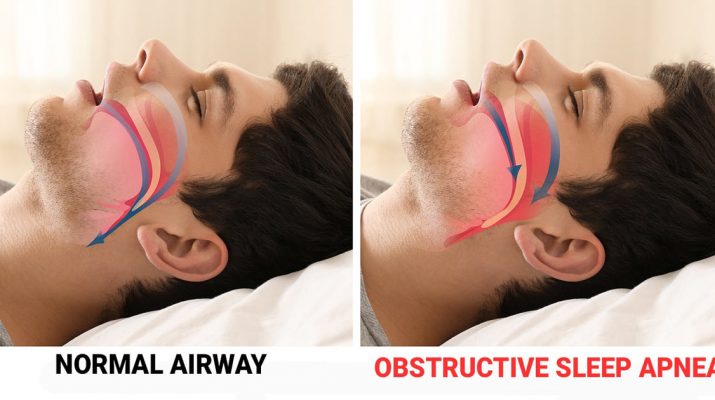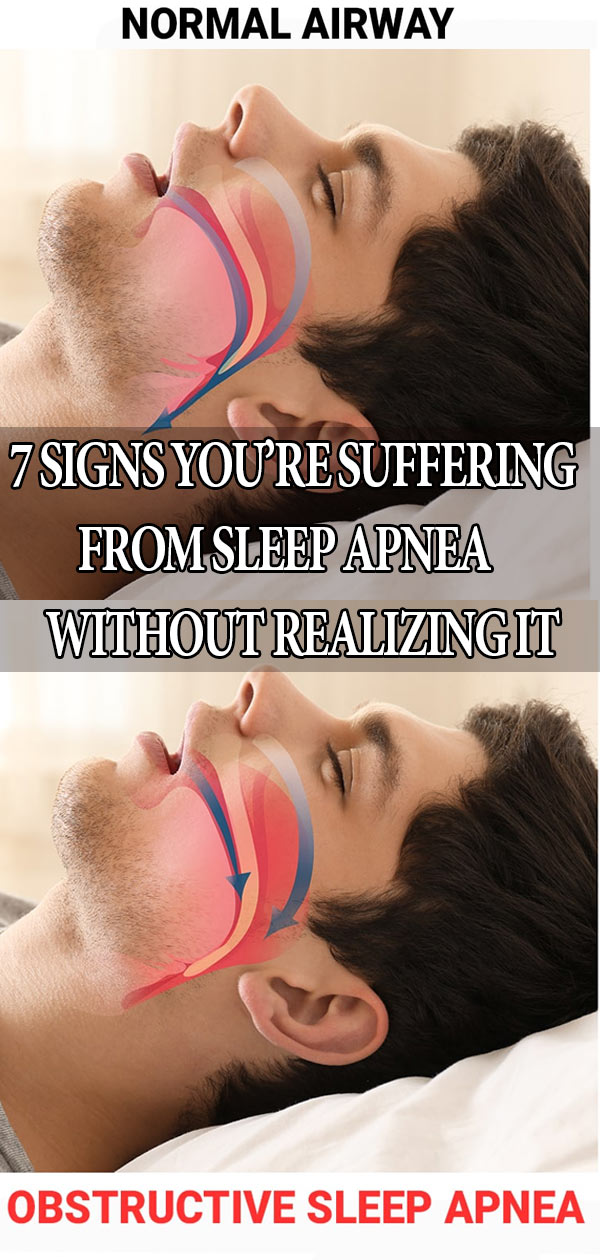Sleep apnea is a type of sleep disorder that may have serious consequences to your life. People who experience sleep apnea reduce the quality of their sleep and rest, which can impact their overall health and well-being.
According to the National Heart, Lung and Blood Institute, sleep apnea is common in the United States. There are, however, different types of sleep apnea with a variety of symptoms, complications, and treatment plans.
- Obstructive sleep apnea happens when the airways are blocked even as the muscles in the throat are relaxed.
- Central sleep apnea occurs when the brain fails to send signals that control your breathing.
In some cases, patients with sleep apnea suffer from both types, so their symptoms are much more complex. This disorder develops due to many factors like weight, age, habits, other health conditions, and the medications you take for these conditions.
While children and women may also have sleep apnea, men are most prone to this condition. Here are some signs that may indicate you are suffering from sleep apnea without realizing it.
7 Signs You’re Suffering From Sleep Apnea Without Realizing It
“Having untreated sleep apnea is medically equivalent to smoking a pack of cigarettes a day in terms of what it does to your health.” – Jerome Siegel
1. You’re Sleeping A Lot But Still Feel Exhausted
It seems that no matter how many hours of sleep you have, you still end up feeling exhausted. If you still feel sleepy during the day despite being in bed for seven to nine hours, it might be a good idea to get yourself checked for sleep apnea.
- One of the most overlooked symptoms of sleep apnea is known as excessive daytime sleepiness (EDS).
- This condition is characterized as having a chronic feeling of tiredness during the day.
- You might not know that you’ve been waking up frequently at night because of an obstruction in your breathing.
- You remain tired when you wake up because you’re not getting a good night’s sleep.
Aside from the tiredness, you may also exhibit a lack of energy, a need to doze off at work, or a difficulty in focusing and concentrating on your tasks. It’s risky to let excessive daytime sleepiness persist because it may lead to accidents. For instance, you could be driving home or using heavy equipment or machines at work then fall asleep from exhaustion and hurt yourself.
2. You’re Always Irritable And Feeling Depressed
Are you easily irritated and prone to being short-tempered? Do you have bouts of mood swings? Is your anxiety level more intense that you feel less positive most of the time? You’re likely irritable because you’re not getting the optimum amount of sleep. Sleep deprivation can lead to depression and anxiety, and undiagnosed sleep apnea could be the cause.
Experts found out that 42 percent of patients with obstructive sleep apnea also suffer from depressionin a study on the Journal of Research in Medical Science. They learned that the chemicals in the brain of people with sleep apnea become imbalanced and go through a roller coaster ride due to the sleep disruption. This could contribute to the mood disorder.
Patients suffering from sleep apnea apparently have low levels of gamma-aminobutyric acid (GABA) and high levels of glutamate. The imbalance of these chemicals alters how the brain works, thus your behavior and mindset also change.
The good news, however, is that the irritable mood and feelings of depression could be reversed if the sleep apnea is managed and treated. Therefore, getting an assessment from a professional for your condition is vital so you know which course of treatment to follow.
3. You’re Packing Some Pounds
As a disruptive sleep due to sleep apnea will make you feel more tired, you won’t likely be motivated to exercise. If you’re not doing physical activities, then it will be easy for you to gain weight and pack the pounds you don’t burn.
Men who have a neck circumference wider than 17 inches and women whose neck size is wider than 16 inches are at higher risks of having sleep apnea. The extra fat tissues around their necks and throats could block the airways when they are sleeping. But the sleep deprivation will also change the functions of the hormones in your body. So, you’ll also struggle to lose weight because your metabolism becomes messed up.
A study from the International Journal of Obesity showed that middle-aged women who have sleep disorders are more likely to gain weight than their counterparts who do not have any problems with sleeping. It’s more challenging to manage and control the weight gain if your hormones aren’t performing right.
- Your body makes more ghrelin hormones than leptin hormones when you are sleep deprived.
- Ghrelin signals your body to eat, while leptin tells your body when to stop eating.
- The only way to correct this is to get on a good sleeping routine.
- If you have sleep apnea, you need to get proper treatment to manage this sleep disorder.
4. You Have Headaches When You Wake Up
There are days when you wake up with a pounding headache if you have sleep apnea. This happens because your brain takes in less oxygen when you have frequent breathing pauses.
- A low oxygen level causes your blood vessels to expand.
- This, in turn, leads to headaches.
- If you have a sleep disorder, you’re likely to experience frequent migraine problems.
- These headaches will occur at least eight times more than a person without sleep apnea who simply does not sleep well on occasion.
- Migraines related to sleep apnea usually occur from 4 a.m. to 9 a.m.
Aside from the headaches, you may also experience nausea and vomiting, as well as teeth grinding and deep snoring. If you observe this pattern in your sleep habits, it’s likely that your headache is related to a sleep disorder. As with all problems linked to sleep apnea, treating the disorder will usually resolve the symptoms.
5. You Often Get Up At Night To Pee
Getting up a night to pee is an indication of various health issues, but sleep apnea could be one of them. When your sleep is fragmented and disrupted, your body’s production of anti-diuretic hormones (ADH) may also be affected.
- Under normal circumstances, this hormone prevents your body from urging you to pee in the middle of the night.
- Since it is interrupted, your body gets some mixed signals.
- You become more aware that your bladder is full, therefore you have more trips to the bathroom when you should be really sleeping.
Try to refrain from drinking a glass of water at least two hours before sleeping. If you observe that you need to pee at night despite curbing your water intake, you may have sleep apnea.
6. Your Drive For Intimacy Is Lower
Are you losing interest in having an intimate time with your partner but you can’t explain why? It’s possible you’re suffering from sleep apnea and don’t even know it. You are not alone. Apparently, 70 percent of men who have sleep apnea experience this issue.
A study in the Journal of Sexual Medicine reported that men with sleep apnea may experience erectile dysfunction. Experts cited that because they aren’t getting enough shut-eye, their level of testosterone drops so their drive for intimacy also drops.
A partner who snores too loud because of sleep apnea might also be causing a strain in the romance department. In other cases, the general feeling of tiredness may also contribute to the person’s lack of interest in lovemaking.
Improving the quality of your sleep will bear positive results for your romantic and physical relationship. So, you have another reason to get yourself checked and tested for sleep apnea.
7. Your Blood Pressure Is High
High blood pressure, also known as hypertension, and sleep apnea often go together, according to the American Academy of Sleep Medicine. This is not the kind of pairing that you should welcome when it comes to your health. These two conditions can easily lead to serious complications like a stroke or heart attack if not immediately addressed.
- People with sleep apnea may also likely have high blood pressure because of weight gain.
- Aside from that, their tired body and bad quality of sleep force their heart to work double time.
- If you are hypertensive and have tried everything you can to keep your blood pressure under control, and yet it’s still high, get evaluated for sleep apnea.
- Studies have shown that once treatment for the sleep disorder gets underway, the blood pressure usually drops or levels off to a healthier number.
Diagnosing And Treating Sleep Apnea
Your doctor may refer you to a sleep specialist or a sleep disorder center for tests and evaluations. You might be asked to stay overnight at this place because your sleep and breathing patterns, as well as other body functions, will have to be monitored for analysis.
- If the experts have determined that you have obstructive sleep apnea, you may need additional consultations with an ear, nose, and throat (ENT) doctor.
- You might need to undergo surgery to remove excess tissues that are causing the blockage.
- If your sleep tests show that you have central sleep apnea, you will need to see a cardiologist or a neurologist for further health advice.
- In some cases, a lifestyle change, such as not smoking or drinking, will easily reduce the episodes of sleep apnea.
For severe cases if your symptoms don’t improve, you may need to use a medical apparatus called the CPAP, also known as the Continuous Positive Airway Pressure apparatus. You’ll need to get used to wearing this CPAP whenever you sleep. This device can truly save your life.
Final Thoughts On Signs You’re Suffering From Sleep Apnea Without Realizing It
Untreated sleep apnea can turn into a serious health problem that raises your risks for accidents, diabetes, cardiovascular diseases, and even sudden death.
Apart from the potential treatments above, ask your doctor how to reduce the risk factors especially if related medical conditions are in your family’s history. With consistent and proper treatment, sleep apnea may be successfully managed and controlled.


